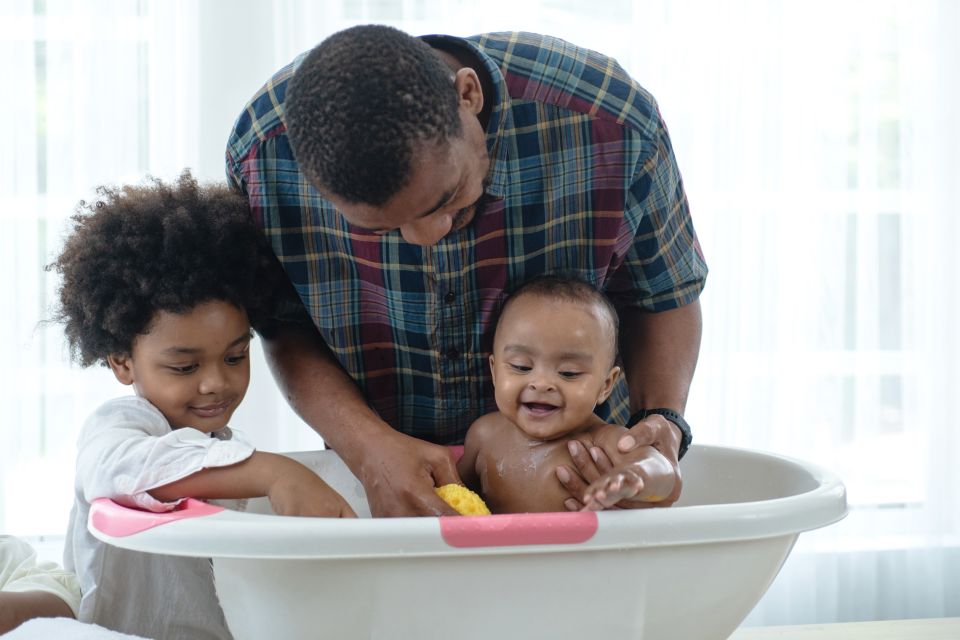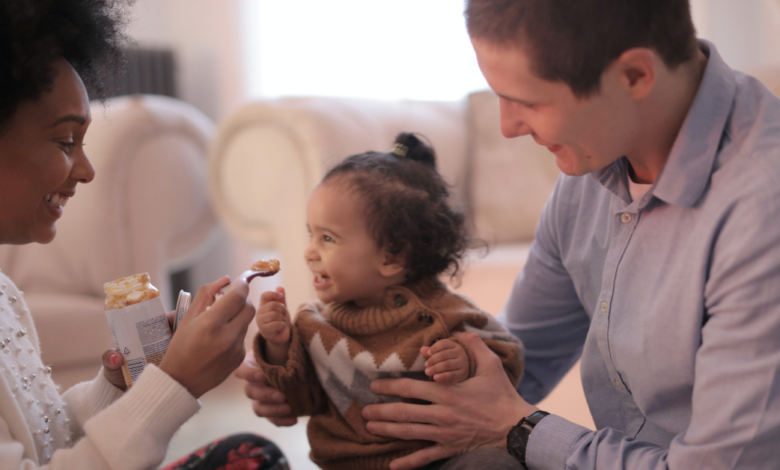What Are Infant Co-Parenting Strategies After Divorce?
After divorce, focus on consistent routines, your child’s well-being, efficient care coordination, open communication, and shared decision-making. These strategies nurture a positive co-parenting relationship crucial for your infant’s growth and stability. Rely on structured plans, trust-building communication, unified parenting approaches, and seamless handovers. Resolve conflicts constructively and seek professional help when needed. These steps lay the foundation for a supportive co-parenting environment that promotes your infant’s emotional and physical well-being.
Key Takeaways
- Establish consistent routines for meals, sleep, and caregiving.
- Prioritize infant’s well-being through nurturing environments and emotional stability.
- Coordinate schedules for shared responsibilities and effective communication.
- Promote open communication, trust, and conflict resolution skills.
- Seek professional help, utilize resources, and attend parenting workshops for support.
Establishing Consistent Routines

To navigate the challenges of infant co-parenting after divorce, ensuring consistent routines is essential for providing stability and support for your child during this period of change. Parental involvement in establishing daily schedules is critical.
Consistency in bedtime routines helps infants feel secure, promoting better sleep patterns and overall well-being. Research shows that maintaining a predictable bedtime can reduce behavioral issues and improve emotional regulation in children of divorce.
Similarly, mealtime consistency is necessary. Sharing information about what your child has eaten and when can aid in maintaining a balanced diet and ensuring that both parents are on the same page when it comes to nutrition. By aligning meal schedules, you can create a sense of continuity for your infant, fostering a comforting environment despite the divorce.
Prioritizing Infant’s Well-being

When managing co-parenting after divorce, prioritizing your infant’s well-being is paramount. Research shows that infants thrive in environments that prioritize emotional stability and consistent routines.
Infant’s Emotional Stability
How can divorcing parents effectively prioritize their infant’s emotional stability during the co-parenting process?
One significant aspect is fostering attachment bonding through responsive caregiving. Research shows that infants who receive consistent and sensitive responses from their caregivers develop secure attachments, which lay the foundation for emotional regulation and stability.
During this challenging time, it’s essential for both parents to maintain a nurturing and supportive environment for the infant. By being attuned to the child’s needs and providing comfort and reassurance, parents can help promote a sense of security and well-being.
Creating a consistent routine that includes quality time with each parent can also contribute to the infant’s emotional stability.
Furthermore, encouraging open communication between co-parents and ensuring that any conflicts or disagreements are resolved away from the child’s presence can prevent unnecessary stress or emotional turmoil for the infant.
Establishing Routines for Infants
Establishing consistent routines for infants plays an essential role in prioritizing their well-being during the challenging process of co-parenting after a divorce. Infants thrive on predictability and stability, and having set routines can provide them with a sense of security during a time of significant change. One key aspect of establishing routines for infants is maintaining consistent sleep schedules. Research shows that a regular sleep routine not only promotes better sleep for infants but also contributes to their overall development and emotional well-being.
In addition to sleep schedules, engaging in bonding activities is another vital component of infant co-parenting. Bonding activities such as reading together, playing games, or going for walks can help strengthen the parent-infant relationship and create a sense of connection between the infant and both parents. These activities not only foster emotional bonds but also provide opportunities for both parents to actively participate in their child’s daily life, despite the challenges of divorce.
Coordinating Care and Schedules
To effectively navigate infant co-parenting after divorce, coordinating care and schedules plays a vital role in ensuring a smooth and stable routine for your child. Collaborative scheduling and coordinated care are essential aspects that can help in managing shared responsibilities effectively.
By communicating effectively with your co-parent, you can create a structured plan that caters to your infant’s needs while also considering each parent’s availability and obligations.
When coordinating care and schedules, it’s important to prioritize your child’s well-being above all else. This means setting aside any personal conflicts and focusing on what’s best for your infant. By working together with your co-parent, you can establish a routine that provides consistency and a sense of security for your child.
Effective communication is the key to successful co-parenting when it comes to coordinating care and schedules. Keeping each other informed about any changes or adjustments can help in avoiding misunderstandings and conflicts.
Promoting Open Communication

Encouraging consistent and open communication between co-parents is fundamental in fostering a healthy co-parenting dynamic that benefits the well-being of the infant.
Trust building is a key component in this process. By being transparent, honest, and reliable in your interactions with your co-parent, you lay the foundation for a relationship built on trust.
Active listening is equally important; it shows respect for your co-parent’s perspective and fosters understanding.
Conflict resolution and compromise are essential skills when promoting open communication. Disagreements are natural, but how you handle them can have a substantial impact on your co-parenting relationship. Approach conflicts with an open mind, focus on finding solutions that benefit the infant, and be willing to compromise when necessary.
Remember, the ultimate goal is to create a supportive environment for your child despite the challenges of divorce.
Research shows that co-parents who communicate effectively have children who exhibit fewer behavioral problems and adjust better to the divorce.
Sharing Decision-Making Responsibilities
Effective co-parenting involves sharing decision-making responsibilities to guarantee both parents are actively involved in important choices affecting the infant’s well-being. Attending co-parenting workshops can provide valuable insights into collaborative decision-making techniques. These workshops often focus on enhancing communication skills, conflict resolution, and understanding the child’s developmental needs. By participating in such programs, parents can learn how to navigate shared decision-making more effectively.
Implementing decision-making frameworks can also streamline the co-parenting process. Establishing clear guidelines for how decisions will be made can help avoid misunderstandings and conflicts. For instance, parents can agree on consulting each other for major decisions regarding the infant’s healthcare, education, and overall upbringing. By having a structured approach to decision-making, both parents can feel more confident in their roles and responsibilities.
Creating a Unified Parenting Approach

When co-parenting after divorce, ensuring a unified parenting approach is key to providing stability for your infant.
Consistent parenting styles help create a sense of predictability and security for your child.
Communication and teamwork between both parents are essential in establishing this cohesive approach.
Consistent Parenting Styles
How can you guarantee that both parents maintain consistent parenting styles to create a unified approach after divorce?
Parenting consistency and setting boundaries are essential elements in ensuring co-parenting harmony and a unified approach post-divorce. Research indicates that children benefit greatly from a stable and consistent parenting environment, even after their parents’ separation. To achieve this, both parents need to communicate openly and work together to establish and adhere to similar rules, routines, and disciplinary strategies.
Consistency in parenting styles helps provide children with a sense of security and structure during a time of significant change.
Maintaining a unified approach requires both parents to align their beliefs, values, and approaches to parenting. It may be helpful to have discussions or seek guidance from a mediator or counselor to resolve any differences and create a cohesive parenting plan. By presenting a united front and presenting a consistent set of expectations, both parents can help their child adjust to the new family dynamic more smoothly.
Communication and Teamwork
To establish a unified parenting approach post-divorce, fostering open communication and teamwork between both parents is fundamental for the well-being and stability of your child. Effective communication plays a key role in ensuring that both parents are on the same page when it comes to shared responsibilities and decision-making.
By openly discussing parenting strategies, concerns, and goals, you can create a cohesive and consistent environment for your infant.
Collaborating is essential in handling co-parenting dynamics after a divorce. Working together as a team requires both parents to set aside personal differences and prioritize the needs of their child.
By approaching parenting as a partnership, you can create a supportive and harmonious atmosphere for your infant to thrive in. Research shows that children benefit greatly from seeing their parents collaborate and communicate effectively, as it fosters a sense of security and stability during a challenging time.
Managing Transitions and Handoffs
During the challenging period of managing changes and handoffs in co-parenting after divorce, what strategies can be implemented to guarantee a smooth and effective process for all involved parties? Handoff support and essential strategies play an important role in ensuring that handoffs between households are as seamless as possible for infants.
Research indicates that creating a consistent routine and schedule can help infants adjust to the changes more easily.
One effective strategy is to establish clear communication between co-parents regarding handoff times, locations, and any special instructions. This can help minimize confusion and anxiety for the infant during handoffs. Additionally, providing handoff support by maintaining a familiar environment, such as having the same blanket or toy during handoffs, can offer comfort and stability to the child.
Another key aspect is maintaining a positive co-parenting relationship during handoffs. Keeping interactions respectful, brief, and focused on the child can help reduce tension and create a more harmonious environment for the infant.
Resolving Conflicts Amicably
Maintaining open and constructive communication channels can foster a collaborative approach to resolving conflicts amicably in co-parenting situations post-divorce. Conflict resolution is an important aspect of co-parenting, especially when it comes to the well-being of your infant. Effective communication plays a key role in addressing disagreements and finding mutually beneficial solutions.
When conflicts arise, make an effort to listen actively to the other co-parent’s perspective without judgment. Express your thoughts calmly and respectfully, focusing on the issue at hand rather than resorting to personal attacks. It’s vital to validate each other’s feelings and experiences to create a safe space for honest discussions.
Consider setting up regular check-ins or meetings to address any emerging conflicts promptly. Establishing clear boundaries and guidelines for communication can help prevent misunderstandings. Remember that compromise is crucial in co-parenting relationships, and finding common ground is essential for the sake of your infant’s stability and emotional well-being.
Seeking Support and Professional Help

When managing the complexities of co-parenting after divorce, seeking support and professional help can be instrumental in fostering a healthy environment for your infant’s well-being. Online resources and counseling services can provide valuable information and guidance on handling the challenges of co-parenting. These resources offer practical tips, expert advice, and coping strategies tailored to your unique situation.
Group therapy and community support can also be beneficial avenues to explore. Engaging in group therapy sessions with other co-parents can create a sense of solidarity and camaraderie. Sharing experiences, challenges, and successes with others in similar situations can help you feel less isolated and more supported.
Community support networks can offer additional resources, such as parenting classes, workshops, and social events designed to promote positive co-parenting dynamics.
Frequently Asked Questions
How Can Co-Parents Manage Long-Distance Arrangements Effectively?
To manage long-distance arrangements effectively, focus on clear communication techniques and flexible visitation schedules. Utilize technology tools for virtual interactions and consider attending parenting workshops together. These strategies can help strengthen your co-parenting relationship despite the distance.
What Are Some Strategies for Handling Cultural Differences in Co-Parenting?
To handle cultural differences in co-parenting, focus on open communication techniques. Embrace cultural sensitivity and set boundaries respectfully. Conflict resolution skills are essential. By understanding each other’s backgrounds, you can navigate differences effectively and create a harmonious co-parenting relationship.
Is It Possible to Co-Parent Successfully With a High-Conflict Ex-Partner?
Managing co-parenting with a high-conflict ex can be challenging, but setting clear communication boundaries, prioritizing conflict resolution strategies, considering therapy options, and seeking legal support when needed can help create a more manageable and peaceful co-parenting dynamic.
How Can Co-Parents Navigate Introducing New Partners Into the Equation?
When introducing new partners, it’s important to set clear communication boundaries to protect your child’s emotional well-being. Approach new relationships with sensitivity to your child’s perspective and provide ample emotional support during this change.
What Resources Are Available for Co-Parents With Limited Financial Means?
When dealing with limited finances, community support can be essential. Look into local organizations that offer assistance, like parenting classes or counseling. Legal aid services might also provide guidance on managing co-parenting agreements effectively within your budget constraints.
Conclusion
To sum up, managing infant co-parenting after divorce requires establishing consistent routines, prioritizing the infant’s well-being, coordinating care and schedules, promoting open communication, sharing decision-making responsibilities, creating a unified parenting approach, handling changes and handoffs, resolving conflicts amicably, and seeking support and professional help when needed.
By implementing these strategies, you can guarantee a smooth and supportive co-parenting relationship that prioritizes your infant’s best interests.

Chad Adan Kace, a young dad from Vermont, shares his parenting journey with a touch of humor and lots of love. Father to a lively baby, he explores the joys and challenges of fatherhood through his stories.







